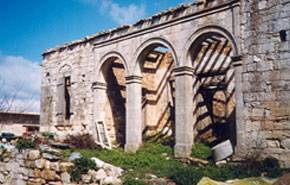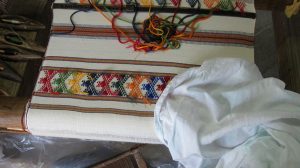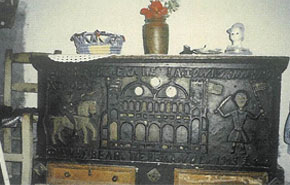Long before it was appreciated that ‘tumble-down’ houses were treasures requiring love and attention, the Laona Foundation had identified rural buildings as an important part of our heritage. Specific measures were undertaken through workshops and on-the-job supervision to ensure that the principles of restoring traditional buildings would be understood and correctly applied by the 20, mainly young, architects engaged by the Laona Project to restore 26 buildings.
 It was a deliberate decision to engage several architects, so that many professionals would acquire the necessary skills and avoid commonly-made mistakes, such as pointing stone walls with grey cement and inappropriate ways of strengthening a building’s load-bearing capacities.
It was a deliberate decision to engage several architects, so that many professionals would acquire the necessary skills and avoid commonly-made mistakes, such as pointing stone walls with grey cement and inappropriate ways of strengthening a building’s load-bearing capacities.
 The Foundation’s latest involvement is with re-invigorating the weaving tradition of Fyti village in Paphos. Known as ‘fytiotiko’, it forms a distinct craft, both in terms of the loom used and the patterns produced, which dates from the Frankish rule of Cyprus (14th century). Work with the Fyti community and its remaining few weavers started around 2010 and in 2016 the fytiotiko method of weaving, which has been passed from mother to daughter for generations, was included on the National List of Intangible Heritage.
The Foundation’s latest involvement is with re-invigorating the weaving tradition of Fyti village in Paphos. Known as ‘fytiotiko’, it forms a distinct craft, both in terms of the loom used and the patterns produced, which dates from the Frankish rule of Cyprus (14th century). Work with the Fyti community and its remaining few weavers started around 2010 and in 2016 the fytiotiko method of weaving, which has been passed from mother to daughter for generations, was included on the National List of Intangible Heritage.
In 2018 the Foundation secured a small grant which enabled it to organise training for 13 young women; to record collections of ‘fytiotiko’ kept in family homes, and to organise a three-day event “Following in the Footsteps of the Weavers”.
During this event, the public was invited to visit the village, watch weavers at work, visit an exhibition of rare and exceptional woven pieces held at the Fyti Cultural Centre and listen to lectures on the subject. Large numbers of Cypriot and foreign visitors attended throughout those three days in May, 2018, as a result of which more women now want to follow training courses, and more thought is being put into contemporary uses for the woven items produced. Moreover, the Fyti experience has opened up a whole new range of proposals about international exchanges between weavers and their traditions, developing visitor routes to the lesser known parts of rural Cyprus and further researching the Fyti tradition and how it survived over the centuries, especially during the 300 years of Ottoman occupation of Cyprus, when the earlier tradition of exporting woven handicrafts to the West came to an end.
 It was a deliberate decision to engage several architects, so that many professionals would acquire the necessary skills and avoid commonly-made mistakes, such as pointing stone walls with grey cement and inappropriate ways of strengthening a building’s load-bearing capacities.
It was a deliberate decision to engage several architects, so that many professionals would acquire the necessary skills and avoid commonly-made mistakes, such as pointing stone walls with grey cement and inappropriate ways of strengthening a building’s load-bearing capacities.


 Beyond buildings, many other aspects of cultural heritage were identified, and by the time the River Valleys Project was carried out (Life Third Countries, 2002-2004), rare traditional furniture was recorded, as well as songs and poems that had been kept alive by oral tradition.
Beyond buildings, many other aspects of cultural heritage were identified, and by the time the River Valleys Project was carried out (Life Third Countries, 2002-2004), rare traditional furniture was recorded, as well as songs and poems that had been kept alive by oral tradition. The Foundation’s latest involvement is with re-invigorating the weaving tradition of Fyti village in Paphos. Known as ‘fytiotiko’, it forms a distinct craft, both in terms of the loom used and the patterns produced, which dates from the Frankish rule of Cyprus (14th century). Work with the Fyti community and its remaining few weavers started around 2010 and in 2016 the fytiotiko method of weaving, which has been passed from mother to daughter for generations, was included on the National List of Intangible Heritage.
The Foundation’s latest involvement is with re-invigorating the weaving tradition of Fyti village in Paphos. Known as ‘fytiotiko’, it forms a distinct craft, both in terms of the loom used and the patterns produced, which dates from the Frankish rule of Cyprus (14th century). Work with the Fyti community and its remaining few weavers started around 2010 and in 2016 the fytiotiko method of weaving, which has been passed from mother to daughter for generations, was included on the National List of Intangible Heritage.